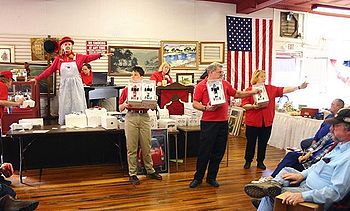The Business and Economics Portal Business is the practice of making one's living or making money by producing or buying and selling products (such as goods and services). It is also "any activity or enterprise entered into for profit." A business entity is not necessarily separate from the owner and the creditors can hold the owner liable for debts the business has acquired. The taxation system for businesses is different from that of the corporates. A business structure does not allow for corporate tax rates. The proprietor is personally taxed on all income from the business. A distinction is made in law and public offices between the term business and a company such as a corporation or cooperative. Colloquially, the terms are used interchangeably. (Full article...) Economics (/ˌɛkəˈnɒmɪks, ˌiːkə-/) is a social science that studies the production, distribution, and consumption of goods and services. Economics focuses on the behaviour and interactions of economic agents and how economies work. Microeconomics analyses what is viewed as basic elements in the economy, including individual agents and markets, their interactions, and the outcomes of interactions. Individual agents may include, for example, households, firms, buyers, and sellers. Macroeconomics analyses the economy as a system where production, distribution, consumption, savings, and investment expenditure interact, and factors affecting it: factors of production, such as labour, capital, land, and enterprise, inflation, economic growth, and public policies that have impact on these elements. (Full article...) Selected article Microsoft Corporation, or often just MS, is an American multinational computer technology corporation with 79,000 employees in 102 countries and global annual revenue of US $51.12 billion as of 2007. It develops, manufactures, licenses and supports a wide range of software products for computing devices. Headquartered in Redmond, Washington, USA, its best selling products are the Microsoft Windows operating system and the Microsoft Office suite of productivity software. These products have prominent positions in the desktop computer market, with market share estimates as high as 90% or more as of 2003 for Microsoft Office and 2006 for Microsoft Windows, in line with Bill Gates's vision "to get a workstation running our software onto every desk and eventually in every home". Founded to develop and sell BASIC interpreters for the Altair 8800, Microsoft rose to dominate the home computer operating system market with MS-DOS in the mid-1980s. The company released an initial public offering (IPO) in the stock market, which, due to the ensuing rise of the stock price, has made four billionaires and an estimated 12,000 millionaires from Microsoft employees. Throughout its history the company has been the target of criticism for various reasons, including monopolistic business practices—both the U.S. Justice Department and the European Commission, among others, brought Microsoft to court for antitrust violations and software bundling. Microsoft has footholds in other markets besides operating systems and office suites, with assets such as the MSNBC cable television network, the MSN Internet portal, and the Microsoft Encarta multimedia encyclopedia. The company also markets both computer hardware products such as the Microsoft mouse and home entertainment products such as the Xbox, Xbox 360, Zune and MSN TV. Known for what is generally described as a developer-centric business culture, Microsoft has historically given customer support over Usenet newsgroups and the World Wide Web, and awards Microsoft MVP status to volunteers who are deemed helpful in assisting the company's customers. Selected image
Selected economyAustralia is a highly developed country with a mixed economy. As of 2023, Australia was the 13th-largest national economy by nominal GDP (gross domestic product), the 19th-largest by PPP-adjusted GDP, and was the 21st-largest goods exporter and 24th-largest goods importer. Australia took the record for the longest run of uninterrupted GDP growth in the developed world with the March 2017 financial quarter. It was the 103rd quarter and the 26th year since the country had a technical recession (two consecutive quarters of negative growth). As of June 2021, the country's GDP was estimated at $1.98 trillion. The Australian economy is dominated by its service sector, which in 2017 comprised 62.7% of the GDP and employed 78.8% of the labour force. At the height of the mining boom in 2009–10, the total value-added of the mining industry was 8.4% of GDP. Despite the recent decline in the mining sector, the Australian economy has remained resilient and stable and did not experience a recession from 1991 until 2020. Among OECD members, Australia has a highly efficient and strong social security system, which comprises roughly 25% of GDP. (Full article...) Selected quote"Condit's successors once again emphasized civil aviation. The 777 is a success, and the Dreamliner appears a better vehicle for the future than the huge Airbus 380. By 2008, Boeing had regained from Airbus its leading position in commercial aviation and the share price its earlier value. At Boeing, as at ICI, shareholder value was most effectively created when sought obliquely. That profit-seeking paradox, like the conundrum of happiness, illustrates the power of obliquity. Comparisons of the same companies over time are echoed in contrasts between different companies in the same industries. Jim Collins and Jerry Porras undertook paired comparisons between outstanding ('visionary') companies and adequate, but less remarkable firms with similar operations. Merck and Pfizer was one such comparison. Collins and Porras compared oblique philosophy of George Merck-'We try never to forget that medicine is for the people. It is not for the profits. The profits follow, and if we have remembered that, they have never failed to appear. The better we have remembered it, the larger they have been'-with the directness of John McKeen of Pfizer-'So far as humanly possible, we aim to get profit out of everything we do'." TopicsRelated WikiProjectsDid you know (auto-generated) -
On this day in business history
General imagesThe following are images from various business-related articles on Wikipedia.
More did you know
Business news Wikinews Economy and business portal
|






































